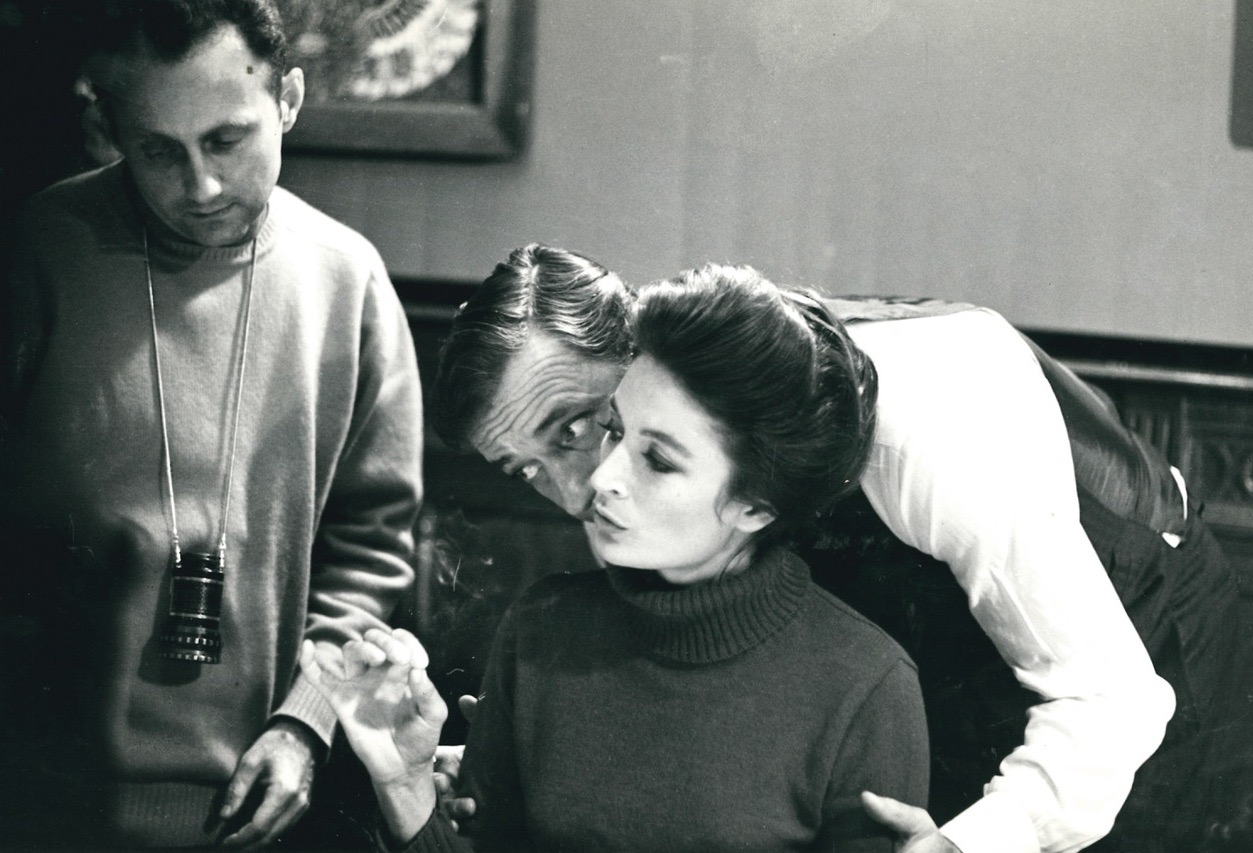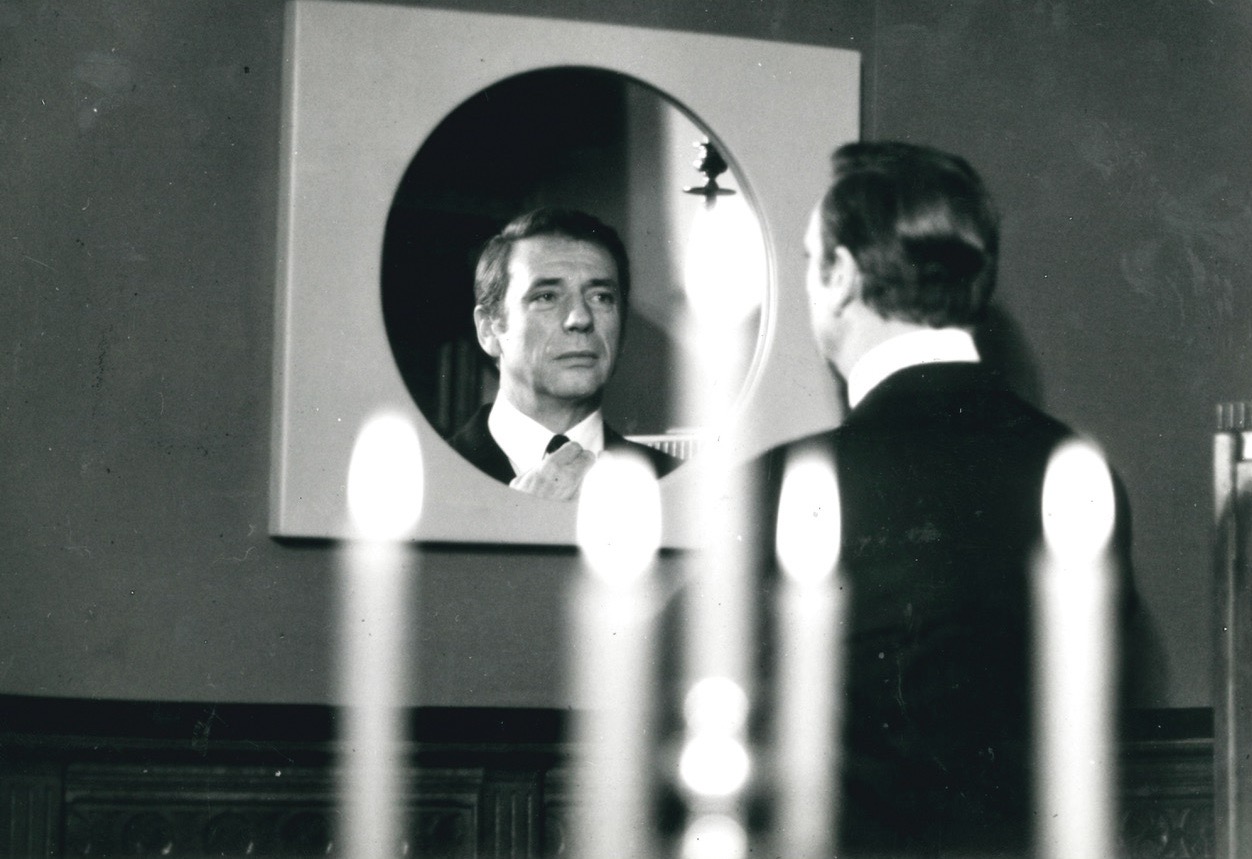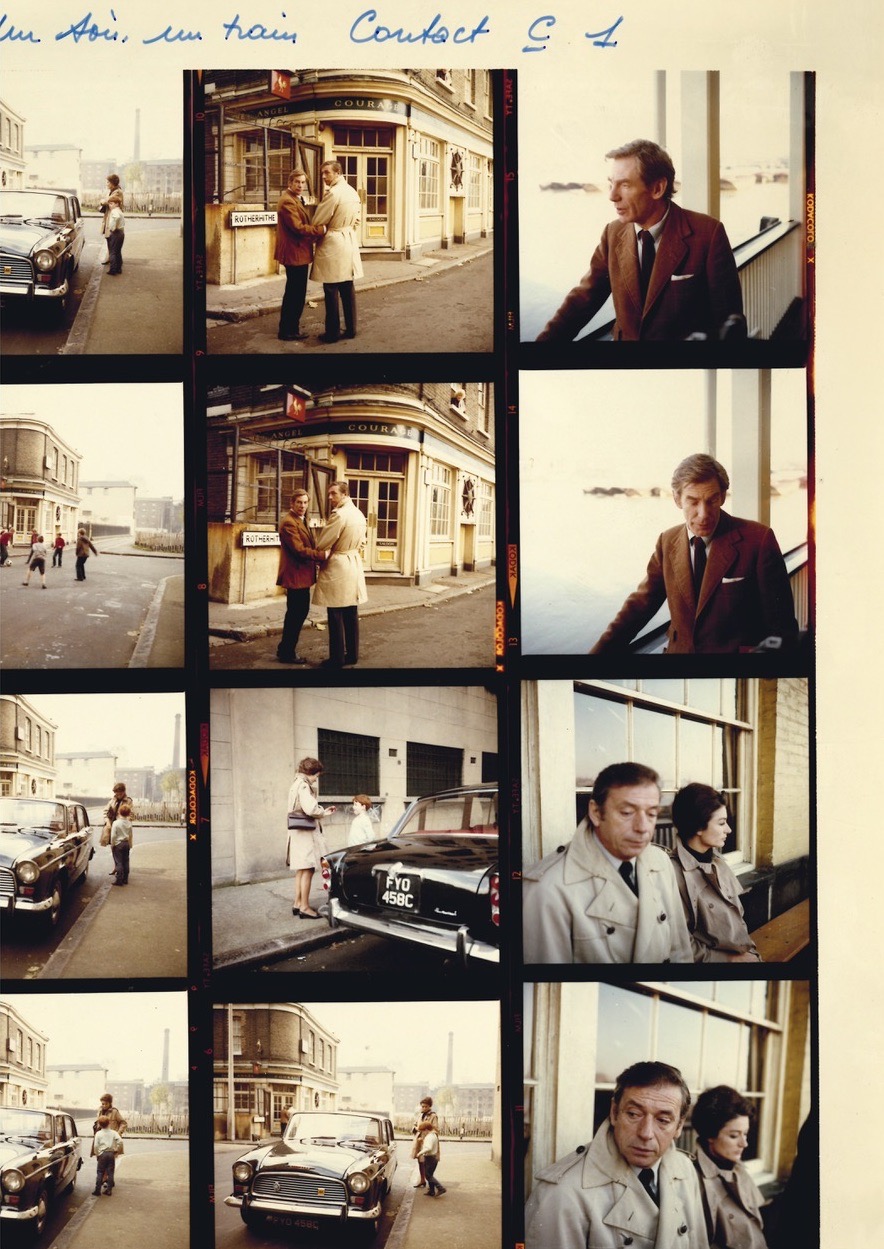Un soir, un train
Nightmare of a Divided Self and Nation

Displacement in relation to language stands at the center of André Delvaux’s troubling and troubled Un soir, un train (1968) – so precisely and so relentlessly that even the disquiet created by the collision of disparate nouns in the poetic title (a time and a place/thing/vehicle, improbably yoked together like a chance meeting between a sewing machine and an umbrella on a dissecting table) arguably becomes lost or at least diluted in its English translation. One Night… A Train, by contrast, feels like the opening phrase in a familiar-sounding narrative, a prosaic flow of words that accounts for the three-period ellipsis, continuance replacing collision. And somewhere in between this collision and this continuance is the sort of stasis or uncertainty of both time and place evoked by the Dutch title of the Johan Daisne novella that the film is loosely based on, De trein der traagheid, which my Google translation engine, recognizing it as Dutch, translates as “The Train of Indolence”.
In the film, a conflict is being played out between Mathias (Yves Montand), a Flemish linguist and literature professor, and a theatrical stage designer named Anne (Anouk Aimée) who left France to live with him in Belgium and feels both excluded and scorned by the Flemish members of Mathias’s circle. In the film’s opening scene – after see-through credits launch Delvaux’s first color feature with what looks like a black and white snowy landscape seen from a moving train over a plaintive song about the seasons sung by a woman vocalist (with lyrics by Delvaux) – Mathias is visiting his French-speaking grandmother, who recalls him refusing to go to a cinema with her at the age of ten because he felt ashamed of her, a memory that Mathias diffidently denies and shrugs off (“Mais non!”), suggesting another half-hidden sign of the same syndrome.
Lacking the pivotal character of Anne, the original story apparently provided Delvaux with part of his narrative armature (the indolent train) without its romantic underpinnings or its linguistic dimension – the clash between Flemish and French providing an impasse between a Belgian linguist and literature professor and his French lover living together in Leuven while the Flemish students at the local university are out on strike. Moreover, Johan Daisne was a pseudonym adopted by Herman Thiery (1912-1978), suggesting another form of existential displacement and uncertainty. Knowing who you are, what you are, and where you are can sometimes become interconnected and even interchangeable questions, and Daisne’s and Delvaux’s story works overtime in holding the answers to such questions in queasy, delicate suspension.
I’m unqualified to say how much of this displacement is colonialist (i.e., Belgium colonizing the Congo) as well as linguistic, counting colonialism among the discomforts of an already marginalized and linguistically fragmented country. But the common American mistake of confusing Belgium with France – quite similar to the common French mistake of confusing Canada with the United States – commonly overlooks the bilingual conflicts of Belgian (and Canadian) life, and a certain number of colonial assumptions unmistakably lie behind this confusion. It’s surely no coincidence that what I would identify as the first disquieting shot in Un soir, un train is a reverse-angle in a lecture hall that reveals that Mathias is speaking to only a dozen students, some of them Black, all of them standing in the very back of the hall like obedient soldiers held at attention until he motions for them to seat themselves – and, as we subsequently learn, these are all Francophone students because those speaking Flemish are on strike. (In the following scene, continuing this theme, Mathias joins Ann at a rehearsal of a Flemish production of Elckerlijc/Everyman that he adapted, where the notion of a divided self—literally the self and the “non-self” – is directly discussed.)

Perhaps in part because of its insistence on dealing with these painful issues, Delvaux’s second feature failed at the box office when it was first released in spite of its two popular stars (having made back less than a third of what it had cost, $1,650,000, by the end of 1970), and I assume it was likely excluded from CINEMATEK’s otherwise excellent Delvaux DVD box set because of rights issues. But neither of these facts seems to account for the almost cursory treatment given to the film in the two books about Delvaux that I possess, Frédéric Sojcher’s André Delvaux: Le cinéma ou l’art des rencontres (Seuil/Archimbaud, 2005) and Adolphe Nysenholc’s André Delvaux ou le réalisme magique (Cerf/Corlet, 2006). Furthermore, a surprising amount of the critical writing on Delvaux, at least in English, seems to regard his first feature, De man die zijn haar kort liet knippen, as the filmmaker’s most important – or even in some cases his only important – achievement. But I personally consider Un soir, un train second only to the Delvaux feature that immediately followed it, Rendez-vous à Bray, as his greatest and most powerful work. Yet there’s a certain grim logic in this film about repression and denial having been itself repressed and denied in various ways. It would appear that this declaration of a divided self/consciousness/nation continues to disturb as well as illuminate certain aspects of Belgian identity. It’s also worth knowing or recalling that André Delvaux (1926-2002) was born in a Flemish-speaking part of Belgium and, after his family moved, he entered a French school at the age of six. It also seems worth noting that the day before his death – two decades ago, at an international conference held in Valencia – he spoke ruefully and at length about the potent cultural mix that characterized his country before it became a federal state where subsidies supporting Belgian filmmaking had to come from either the French or the Flemish community but never from both—a move which effectively banished Flemish cinema from most people’s awareness. (In the same lecture, he expressed some regret that Un soir, un train hadn’t addressed this issue more politically and less metaphysically.)
It’s tempting yet limiting to call Delvaux a Belgian surrealist – or, as many would prefer, “magical realist”. French Surrealism is or was an actual movement, but the other two categories are at most tendencies. For me, one significant difference between French and Belgian surrealism is that the former is in rebellion against the bourgeoisie while the latter virtually equates the bourgeoisie with the cosmos. But this latter position can’t really be identified in national terms, because Franz Kafka in Czechoslovakia, Sadegh Hadayat in Iran and France, and Ambrose Bierce in the US (in his “An Occurrence at Owl Creek Bridge”), among others, all seem to share it.
Un soir, un train, the Delvaux film that comes closest to Kafka, Hadayat and Bierce, follows Mathias as he departs on a train to give a lecture in another town – first quarreling with Anne, who walks away from him shortly before he leaves but later unexpectedly joins him in his compartment then mysteriously disappears from it while he dozes off. After the train stops in a desolate wasteland, things become progressively stranger as he gets off with an older man and a younger man, the train leaves without them, and they eventually wander together into a mysterious town. The “incomprehensible”, untranslated language they hear spoken in this town is in fact Farsi – and certain affinities of the story with Hedayat’s nightmarish The Blind Owl (a novella about a bride becoming a forgotten corpse to her husband) may well have inspired this choice of foreign language.
The overall narrative development in De man die zijn haar kort liet knippen from normality to insanity is comparably unnerving. The schizophrenia of the hero in Daisne’s novel – a middle-aged lawyer with a family who teaches at a local high school, and is quietly obsessed with a graduating girl pupil – is established by presenting his story as a flashback from a mental asylum, but the film, far less guided by its first-person narration, introduces this schizophrenia so incrementally and ambiguously that we’re held in a queasy kind of abeyance, and can’t even be sure at the end whether or not he’s murdered his former pupil after running into her at a hotel years later. (Meanwhile, he’s quit his job to become a court clerk and attended an autopsy, in both cases with obscure motivations.) The fact that he barely looks at her during their climactic dialogue in her hotel room is only part of what’s so weird about the scene. There are odd hints about his condition throughout the film, from his behavioral tics to Delvaux’s unconventional edits, but the fact that we can’t distinguish between his mental reality and our objective perceptions is a constant.
Similarly, in Un soir, un train, Delvaux’s seamless transitions from waking life to dreams or memories and back again tend to follow an emotional logic that retroactively seems inevitable. The editing, which periodically inserts unannounced flashbacks (of trips to England and Spain) or flash-forwards (to images tied to Anne’s death from a train wreck), recalls some of the rhythms and strategies of Alain Resnais in postulating memory as a series of emotional associations and links, fatefully equating the past with the future in a tragic manner that is also made to seem musical. There are also symmetrically rhyming patterns of image or sound linking dreams with waking activities. Mathias’s failure to have a child and his inability to find his father’s gravesite mesh together both thematically and poetically, like reverse sides of the same coin; they may also have some relation to the younger and older men who turn up as the hero’s companions in the story’s increasingly terrifying and increasingly irrational second half, evoking respectively aspects of his youth and encroaching old age while respecting the contours and abrupt transitions of a troubled dream. And to wake from that dream doesn’t mean a “return to reality” in any ordinary sense. In the terms of this film, it means a deepening of the mysteries surrounding both love and death – a fall into infinity.

Images from Un soir, un train (André Delvaux, 1968), courtesy of Editions Montparnasse.
Seuls: Un soir, un train takes place on Thursday 1 December 2022 at 20:30 in KASKcinema, Ghent. You can find more information on the event here.

